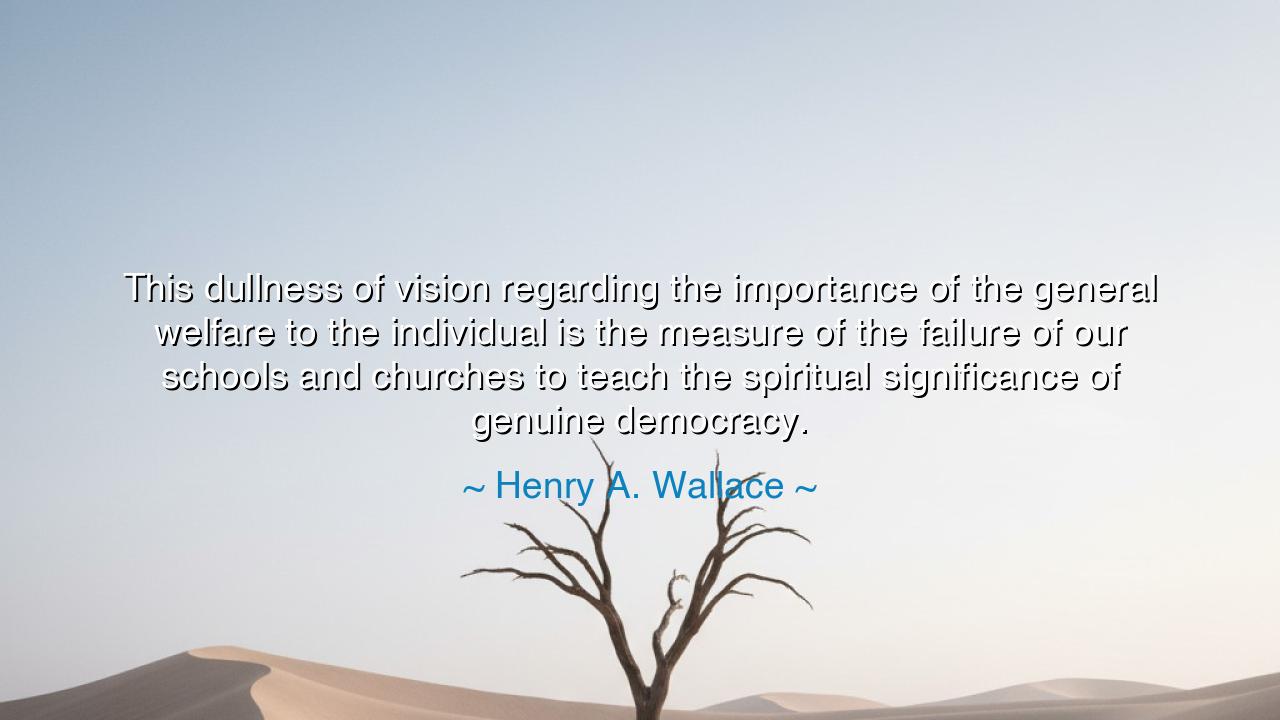
This dullness of vision regarding the importance of the general
This dullness of vision regarding the importance of the general welfare to the individual is the measure of the failure of our schools and churches to teach the spiritual significance of genuine democracy.






Host: The living room was quiet, the soft ticking of a clock breaking the silence in the background. Outside, the world had settled into the peaceful hum of the evening, but inside, there was a deep sense of reflection. Jack sat on the couch, his eyes scanning a book, but his mind was clearly focused on something deeper. Jeeny sat across from him, her tea resting in her hands, her attention on him as she waited for the right moment to speak.
Jeeny: (breaking the silence, her voice calm yet filled with thought) “You know, Henry A. Wallace once said, ‘This dullness of vision regarding the importance of the general welfare to the individual is the measure of the failure of our schools and churches to teach the spiritual significance of genuine democracy.’”
(She looked at Jack, her voice gentle but probing.) “What do you think he meant by that? About the failure of schools and churches to teach the spiritual significance of democracy?”
Jack: (pausing, his voice reflective as he processed the words) “I think he’s talking about how we’ve lost sight of the bigger picture — how the well-being of the individual is inherently tied to the well-being of the community. Democracy, at its core, isn’t just about individual freedom or rights. It’s about understanding that the general welfare of the group impacts every individual within it. But if our institutions, like schools and churches, don’t emphasize this connection — that our lives are intertwined with others — then we fail to nurture a deeper, more spiritual understanding of what democracy truly means.”
Jeeny: (nodding slowly, her voice steady and insightful) “Exactly. Wallace is saying that true democracy isn’t just about political structures or economic systems. It’s about recognizing that our spiritual responsibility to one another is the foundation of it all. When we fail to teach people that our collective welfare is just as important as our individual rights, we’re missing the core message of what democracy should be about. It’s not just about what we can take, but about what we can give to the greater good.”
Jack: (smiling faintly, his tone lighter now) “It’s true, isn’t it? We’ve become so focused on the individual that we’ve forgotten how much our collective welfare shapes us. In a democracy, we have to think beyond ourselves — about the impact we have on others, the responsibility we share. When we neglect to teach that, we end up with a version of democracy that’s shallow and transactional, rather than nurturing and community-oriented.”
Jeeny: (gently, her voice full of warmth) “Yes, and I think Wallace is highlighting the spiritual aspect of this — that democracy isn’t just about laws and rights; it’s about ethics, compassion, and solidarity. It’s about living in a way that honors everyone’s humanity, not just our own.”
Jack: (nodding, his voice more assured now) “Right. Democracy is about recognizing that we’re all in this together. That’s where the spiritual significance comes in. When we understand that our lives are deeply connected to the welfare of others, we become better at building a society that works for everyone. It’s about being a part of something larger than ourselves.”
Jeeny: (smiling softly) “Exactly. And when that sense of interconnectedness is lost, so too is the true spirit of democracy. It’s not just about voting or policies; it’s about living the values of equality, respect, and shared responsibility in every aspect of our lives.”
Host: The room felt quieter now, the weight of Wallace’s words settling between them like a gentle truth. The idea that democracy wasn’t just a political system, but a spiritual practice, one that required us to see the importance of collective well-being alongside individual rights, had a profound impact on both of them. Jack and Jeeny shared a moment of understanding, realizing that without the focus on the general welfare, democracy couldn’t fulfill its true purpose.
Jack: (softly, with a sense of peace) “Maybe that’s the core of what we’re missing — that balance between individual freedom and community responsibility. When we forget the connection between the two, we lose sight of what democracy was meant to be.”
Jeeny: (nodding, her voice full of quiet conviction) “Yes. It’s about creating a society where we value everyone’s well-being, not just our own. That’s the true essence of democracy.”
Host: The night outside continued its quiet rhythm, but inside, the understanding that democracy’s true power lay in recognizing the collective welfare — and the responsibility we all had to it — settled in like a quiet call to action. Jack and Jeeny both knew that real democracy could only be achieved when the individual’s rights were in harmony with the community’s needs. In that realization, there was both clarity and purpose — the understanding that true democracy was about much more than systems and laws. It was about shared humanity, compassion, and responsibility.






AAdministratorAdministrator
Welcome, honored guests. Please leave a comment, we will respond soon